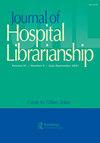Workplace Education Program Fosters a New Generation of Health Librarians
Q3 Social Sciences
引用次数: 0
Abstract
Libraries in health care environments play a major role in enabling evidence informed practice for patient care and medical research. Libraries make this contribution in the face of constant change where the power of the librarian is of utmost importance (1). With changes following the COVID-19 pandemic, it is essential that librarians possess the competencies needed to support evolving digital libraries and meet the technological demands involved in supporting 24/7 seamless access to online resources, distance education and digital scholarship (2). Even with this scope of work, librarian positions in health environments are vulnerable to economic fluctuations in health care. This has been highlighted by staff loses and site closures, including librarian retirement (1,3). The latest census of Australian health libraries raises further concerns about the maturity of the health librarian workforce, which may undergo significant attrition and consequent loss of expertise in the next decade (4). Strategic planning is recommended to deal with workforce factors. As today’s graduates are the future of libraries in health care settings, planning should focus on creating opportunities for new librarians. Attention to workplace training programs in health care environments is essential, and the implementation of new library training programs will contribute to sustainable development of the professional workforce while also providing new learning opportunities for the existing workforce. This column depicts a current approach implemented in a health service in Melbourne, Australia. It outlines a Library Cadetship that has been designed for graduates as an entry level paid position coupled with a workplace training program. Reflections from the employer and incumbent Cadets point to the success of the program. This example provides evidence for new entry level positions, enriched by workplace training in health sciences libraries.职场教育计划培养新一代健康图书馆员
卫生保健环境中的图书馆在使患者护理和医学研究的循证实践成为可能方面发挥着重要作用。面对不断的变化,图书馆的力量是至关重要的(1)。随着COVID-19大流行带来的变化,图书馆员必须具备支持不断发展的数字图书馆所需的能力,并满足支持全天候无缝访问在线资源、远程教育和数字奖学金所涉及的技术需求(2)。卫生环境中的图书馆员职位容易受到卫生保健经济波动的影响。工作人员的流失和网站的关闭,包括图书管理员的退休,都突出了这一点。澳大利亚卫生图书馆的最新人口普查进一步提出了对卫生图书馆员劳动力成熟度的担忧,这可能会在未来十年经历重大的人员流失和随之而来的专业知识损失(4)。建议通过战略规划来处理劳动力因素。由于今天的毕业生是卫生保健机构图书馆的未来,规划应侧重于为新的图书馆员创造机会。关注卫生保健环境中的工作场所培训计划是必不可少的,新的图书馆培训计划的实施将有助于专业劳动力的可持续发展,同时也为现有劳动力提供新的学习机会。本专栏描述了在澳大利亚墨尔本的一家医疗服务机构中实现的一种当前方法。它概述了图书馆干部职位,该职位是为毕业生设计的入门级带薪职位,并附有工作场所培训计划。雇主和在职学员的反思表明,该项目取得了成功。这个例子为新的入门级职位提供了证据,卫生科学图书馆的工作场所培训丰富了这些证据。
本文章由计算机程序翻译,如有差异,请以英文原文为准。
求助全文
约1分钟内获得全文
求助全文
来源期刊

Journal of Hospital Librarianship
Social Sciences-Library and Information Sciences
CiteScore
1.00
自引率
0.00%
发文量
43
期刊介绍:
The Journal of Hospital Librarianship is the first journal to specifically address the issues and concerns of librarians and information specialists in the field of hospital librarianship. This peer-reviewed journal focuses on technical and administrative issues that most concern hospital librarians, providing a forum for those professionals who organize and disseminate health information to both clinical care professionals and consumers. The Journal addresses a wide variety of subjects that are vital to the field, including administrative, technical and program issues that may challenge hospital librarians. Articles published in the Journal focus on research strategies, administrative assistance, managed care, financing, mergers, and more.
 求助内容:
求助内容: 应助结果提醒方式:
应助结果提醒方式:


